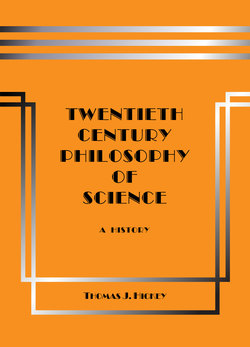Читать книгу Twentieth-Century Philosophy of Science: A History (Third Edition) - Thomas J. Hickey - Страница 9
На сайте Литреса книга снята с продажи.
1.04 Dimensions of Language
ОглавлениеUsing the metalinguistic perspective, philosophers analyze language into what Rudolf Carnap called “dimensions” of language. They are syntax, semantics, ontology, and pragmatics.
Syntax refers to the structure of language. Arrangements of syntactical symbols such as linguistic ink marks on paper display syntactical structure. Examples of syntactical symbols include terms such as words and mathematical variables and the sentences and mathematical equations constructed with the terms.
Syntactical rules regulate construction of grammatical expressions such as sentences and equations usually arranged by concatenation into strings of terms.
Semantics refers to the meanings associated with syntactical symbols. Syntax without semantics is systematic but literally meaningless. Adding meanings to the symbols makes the syntax “semantically interpreted”.
Semantical rules describe the meanings associated with elementary syntactical symbols. In the metalinguistic perspective belief in the truth of semantically interpreted universally quantified sentences such as the stereotypic “Every raven is black” enables the sentences to function as semantical rules displaying the complex meanings of their component descriptive terms. Belief in the statement “Every raven is black” makes the phrase “black raven” redundant, thus displaying the meaning of “black” as a component part of the meaning of “raven”. The lexical entries in a unilingual dictionary exemplify an inventory of the semantical rules for a language.
Ontology refers to the aspects of reality described by semantically interpreted sentences believed to be true, especially belief due to experience or systematic empirical testing. This is the thesis of ontological relativity. Ontology is typically of greater interest to philosophers than to linguists.
Semantics is knowledge of reality; ontology is reality as known.
Semantics is the perspectivist signification of reality; ontology is the aspects of reality signified by semantics. Ontology is the aspect of mind-independent reality that is cognitively captured by the perspective revealed by the semantics.
Not all discourses are equally realistic; they are as realistic as they are empirically adequate. And since all semantics is relativized and ultimately comes from sense stimuli, there is no semantically interpreted syntax of language that is utterly devoid of any associated ontology.
Pragmatics in philosophy of science refers to how scientists use language, namely to create and test theories, and thereby develop scientific laws used in test designs for future testing and in scientific explanations of events.
